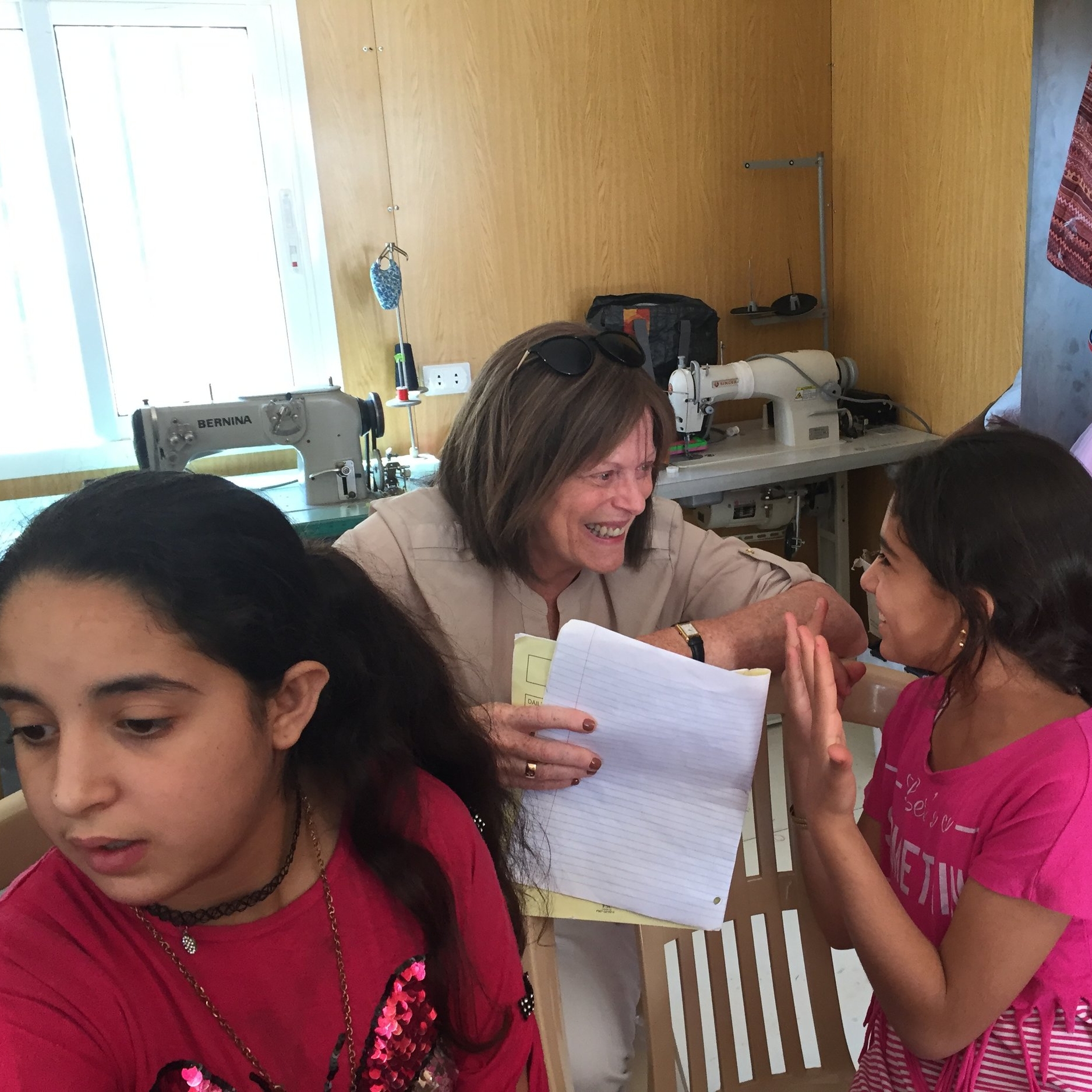Lebanon: Day Two - The Circle of Life
by Evangeline Paschal for the team
“Take care of your talents, because they belong to God.”
Izdihar Kassis is speaking to a room full of twenty-two Syrian refugee mothers with their infants in tow. They have come to this monthly meeting to gather diapers, formula, and handmade crocheted dolls for their babies. Fifteen women were expected but once word spread, others eagerly joined walking from nearby refugees camps, some accompanied by their other children. Izdihar does not want to turn anyone away, and fortunately there is enough to go around today. But before she begins the distribution, she shares a message with them. Harkening to Jesus’s parable of the talents, she tells the mothers that their children are like the talents given by the rich man to his workers. The sweet-faced mother next to her has six children, her friend next to her has four, and Nadya, a tall woman with a happy smile, had recently had her first child after seven years of marriage. But as in the parable, the number did not matter. What was important was how a woman raises her children. Will they be morally strong? Will they be peacemakers? Will they follow Jesus’s example? Or will they learn to steal, cause trouble, and seek the path of strife and conflict? As mothers, they are responsible for investing their talents wisely.
The mothers pay attention as she speaks, even as they are nursing or placing an errant shoe back on their child’s tiny foot. As they collect their provisions and shuffle out into the hard late-morning sun, Izdihar turns to us and explains that she hosts two of these meetings each month at this location of her ministry, Together for the Family (TFF), in the city of Zahle in the Beqaa Valley, just forty minutes from Damascus. Zahle is one of the largest Christian enclaves in Lebanon but since the Syrian war began, the agricultural fields in this breadbasket of Lebanon have become dotted with Sunni Muslim refugee camps large and small. Each is full to the brim with children of all ages, including newborns. Being born into a refugee camp is an inauspicious start to life, but TFF’s mission is to provide refugee mothers and children with the support, skills, and spiritual succor to meet this challenge head-on. In the process hearts are softened, and the seeds of Christ’s love for us are planted.
The room where we gathered with the mothers and infants is just one structure in a small campus that Izdihar has built on land rented from her assistant’s landlord. Across the path outside the building is a one-room dental clinic staffed three days a week, and next to that is a room that will soon become a studio for teaching hairdressing skills, with four ancient sewing machine tables with mirrors propped on top serving as makeshift salon stations. There is a new concrete basketball court at the edge of the property and, right next to the room where the mothers gathered, a sewing clinic. We spent part of our morning in this clinic where the back wall is lined with sewing machines and spools of thread, and two mannequins display red and black formal dresses created by the sewing students. But today is Friday, which means that the students are taking a break from their weekday sewing classes to practice their English skills on donated laptops. This will enable them to communicate effectively about their sewing work. Today, for example, they are learning their colors in English, typing each word several times in the matching color font and calling out to Izdihar examples of items of each color in the room. Most of the students are girls around twelve years old, but some mothers also attend these classes, determined to learn a new skill and some English. One of these mothers sat next to me, delightedly pointing out that my dress included the color “yellow.” She soon whipped out her phone to show me pictures of her family including her two beautiful daughters, one of whom she had named “Maria.” As she practiced her English with me, it was apparent that she was eager to make a connection. Our hearts both softened. A seed has been planted.
After saying good-bye to Izdihar we headed west into the mountains into the area known as Mount Lebanon, traditionally considered the heart of historic Lebanon. Our destination was the town of Hamana, where the Hamlin Nursing Home ministry is located. This picturesque institution overlooking a postcard-worthy valley dates back to the days of the Ottoman empire when an intrepid doctor named Mary Pierson Eddy started a tuberculosis sanitarium that she named after her Presbyterian pastor from Washington, D.C. Later, a nursing school was added, which has since closed. Today one of the graduates of that nursing school, Sanaa Koreh, directs Hamlin, an assisted living facility run by the National Evangelical Synod of Syria and Lebanon. In addition to round-the-clock care for its senior residents, Hamlin provides regular chaplain-led services and runs an outpatient physical therapy clinic. The sunlit rooms and garden setting make the whole property a tranquil setting for the twilight years of the residents which include a husband and wife and brother and sisters. The same compassionate care that underlines Izdihar’s ministry to mothers and children is found here at Hamlin, where Sanaa dreams of expanding her ministry by refurbishing the old nursing school building to house a new, revamped nursing program, possibly in connection with vocational training. Leaving Hamlin this afternoon felt like completing a tour of the circle of life. But at the same time, it felt like beginning that circle all over again, with new dreams and goals just coming into sight.
Evangeline Paschal
National Presbyterian Church
Washington, D.C.





